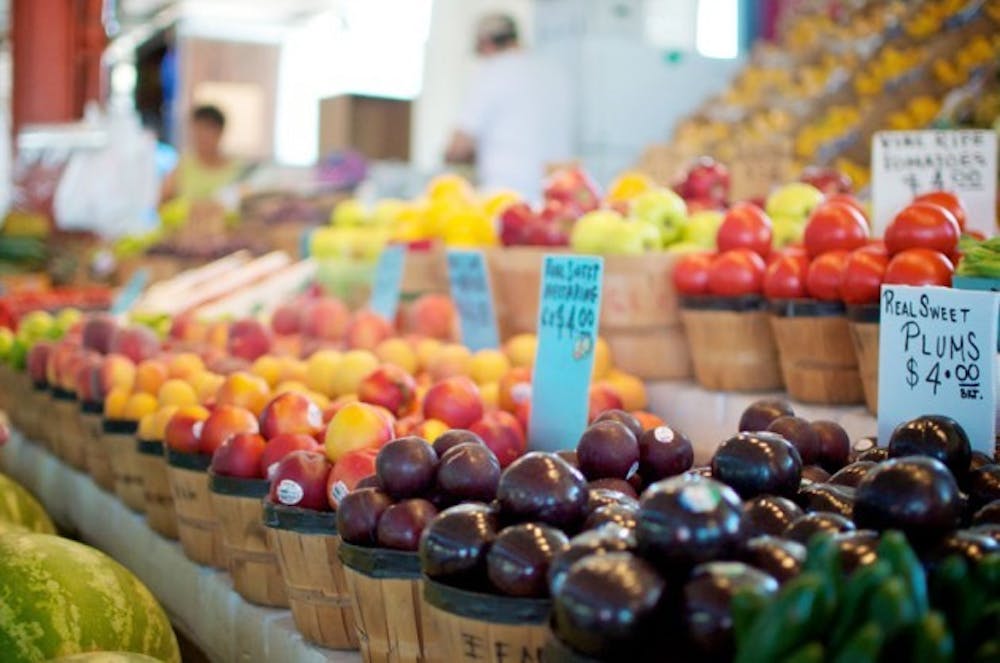After Shivani Kamodia slaughtered a live chicken, her thoughts on food changed.
She was participating in in organic farms program, following which Kamodia decided to only eat local and organic meat.
“I love meat,” she said. “But I decided that I should be able to look my dinner in the eye and know that I’m eating a living thing.”
She’s not the only person on UB’s campus to go local. Locally grown foods are served on UB’s campus and a budding garden shows homegrown and “sustainable” foods have staying power among some faculty and students.
Kamodia, a UB alum who graduated in May 2014 with a Bachelor’s of Science in Environmental Health Science, a major she created, believes consumers who purchase locally grown, organic food have a positive impact on the local economy.
“You vote with your dollar,” she said.
Adjunct instructor Ralph Critelli, who teaches Intro to Environmental Studies and History of the Environmental Movement, also supports sustainable eating.
“Locally grown food is less mysterious,” he said. “In many cases we know the person growing it. We are more aware of the process, and the food tends to be fresher.”
Critelli believes the short-term cost of sustainable eating is worth the long-term payoffs.
“What's more costly – the food, or poor health and a devastated environment?” he said. “Are we just to live for ourselves – are we just to live for today?”
Students who want to eat locally grown food can look for the “Pride of New York” symbol on UB Campus Dining & Shops’ (CDS) products. As a member of the Pride of New York Program, CDS supports local farmers and food manufacturers.
Kamodia also recommends purchasing food from the on-campus farmers’ market and the organic section in Wegmans.
UB students can also grow their own food by contributing to the UB Campus Garden located between Greiner Hall and the University Bookstore. One of the garden’s goals is to provide food for CDS.
The garden is in an experimental stage, according to Kamodia, but if it succeeds, there is potential for expansion.
“We went through all the red tape,” Kamodia said. “We did this for [future students]. If they put the effort forward, the school will support the garden’s expansion.”
Sustainability Engagement Coordinator James Simon believes getting involved with the campus garden is an opportunity for students to develop leadership skills.
“We afford them a lot of opportunities to take ownership over the work that we’re doing,” he said. “The students have seen what it means to have a deadline [and] what it means to create a business plan. It’s really like a microcosm of the real-world.”
Students can also participate in hands-on experiences related to sustainable eating by engaging with the Academies, an organization dedicated to involving UB students in community issues and initiatives. Through the Academies, Kamodia completed an internship in environmental advocacy with GrowWNY. The Academies also funded her participation in Buffalo’s annual Tour de Farms, a bicycle tour designed to connect consumers with local farms.
Kamodia was also the president of Environmental Network, a UB student organization dedicated to environmental awareness and activism and another way UB students interested in sustainable eating can get involved.
Looking back, Kamodia said joining the environmental movement was initially overwhelming.
On such a large campus “it seems impossible to have your voice heard,” she said. “Almost every single club struggles with [this problem].”
Kamodia believes student environmental advocates will be most successful if they focus their efforts on a subset of the student population and “take a step back and try not to reach out to the whole campus.”
She also advises students interested in environmental issues to join UB’s professional environmental fraternity, Alpha Kappa Chi (AKX). As a member of AKX, Kamodia is connected to more than 100 brothers. She believes AKX is an invaluable resource for developing a network for the future. Doing work with friends also makes the work more rewarding, she added.
Kamodia believes students interested in environmental issues should focus on making simple adjustments to integrate sustainability into students’ everyday life. For example, Kamodia said, to reduce food waste, students can request CDS to decrease portion sizes.
“It took me four years to realize that it’s really the small, infrastructural things that make a difference,” she said. “It’s not about changing the food or the students. It’s about changing the system.”
email: features@ubspectrum.com





